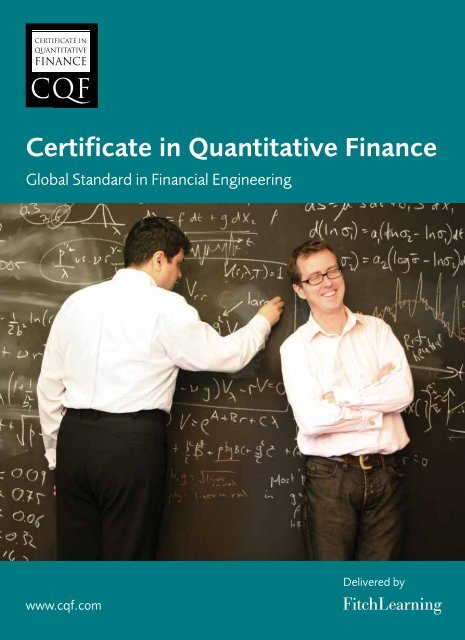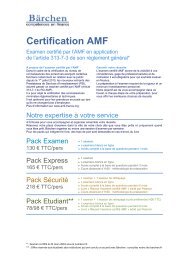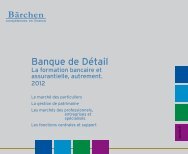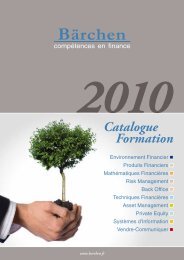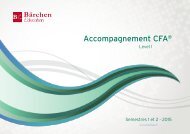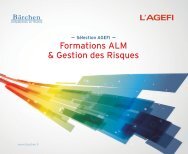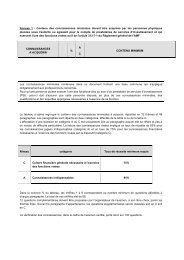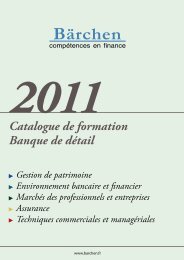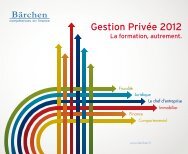Download CQF information leaflet - Barchen.fr
Download CQF information leaflet - Barchen.fr
Download CQF information leaflet - Barchen.fr
Create successful ePaper yourself
Turn your PDF publications into a flip-book with our unique Google optimized e-Paper software.
CERTIFICATE INFINANCE<strong>CQF</strong>Certificate in Quantitative FinanceGlobal Standard in Financial Engineeringwww.cqf.comDelivered by
CERTIFICATE INFINANCE<strong>CQF</strong>Real-world financialengineering“Finance is an increasingly sophisticatedand competitive sector to work in andthe demand for education in quantitativefinance has never been greater. With afocus on the practical implementation ofquantitative techniques, the Certificate inQuantitative Finance (<strong>CQF</strong>) is taught byleading practitioners and is designed tohelp you and your company stay aheadof the competition. Once you qualify, ourever-expanding Lifelong Learning librarywill support you throughout your career.To date, more than 2000 professionalsworldwide have completed the programand the Certificate has gained globalrecognition as the benchmark qualificationfor anyone in, or aspiring to enter, thesphere of quantitative finance.“ContentsAbout the <strong>CQF</strong>.................................................. 3Your <strong>CQF</strong> journey.............................................. 4Where our delegates come <strong>fr</strong>om......................... 6<strong>CQF</strong> alumni ...................................................... 8Online learning resources................................... 9Flexible program delivery..................................10Mathematics for Quantitative Finance Primer.......11<strong>CQF</strong> program content.......................................12Lifelong Learning..............................................15<strong>CQF</strong> faculty......................................................16How to apply...................................................19FAQ................................................................20Our affiliates....................................................22Dr. Paul Wilmott<strong>CQF</strong> Program founderJoin our <strong>CQF</strong> group on
www.cqf.comAbout the <strong>CQF</strong>A world-class professional quants qualificationThe Certificate in Quantitative Finance is an internationally renowned quants qualification designed for individualsworking in, or intending to move into, derivatives, IT, quantitative trading, insurance or risk management.Delivered via flexible online learning, the part-time <strong>CQF</strong> program comprises six modules and offers two studyoptions so you can decide how to complete the <strong>CQF</strong>.It is unique in its structured approach and commitment to the field of real-world financial engineering by providinganalysis of practical quantitative techniques important in the increasingly sophisticated financial landscape. Part ofthe Fitch Group, the <strong>CQF</strong> program is provided by Fitch Learning, a leading global training company with cuttingedgeonline learning portals and centers in London, New York, Singapore and Dubai.WHY TAKE THE <strong>CQF</strong> PROGRAM?Receive an internationally renownedquants qualification• The <strong>CQF</strong> is a prestigious professional qualificationthat provides in-depth analysis of practicalquantitative methods for financial markets.Develop career-enhancing skills• The program is a key career development tool forprofessionals <strong>fr</strong>om a rich diversity of backgroundsand responsibilities who want to build their skills inquantitative finance.Study part-time online• The program is offered via flexible online learning,starting twice a year in January and June• Two study options are availableFull Program: complete the six modules in sixmonthsLevel I & Level II: complete the modules intwo three-month levels. Levels can be taken inseparate programs• Delegates will have permanent access to a cuttingedgeonline learning environment• All lectures are streamed live over the internet andare recorded and made available on the <strong>CQF</strong> Portalwithin 24 hours.Benefit <strong>fr</strong>om expert teaching• Led by Dr. Paul Wilmott, the world-renowned expertin mathematical finance, the <strong>CQF</strong> faculty is a highlyacclaimed team of experts combining experiencedpractitioners and leading academics specializing inthe field of quantitative finance• Delegates receive a <strong>fr</strong>ee one-year subscription toWilmott Magazine.Access our <strong>fr</strong>ee Lifelong Learning library• Our ever-expanding Lifelong Learning library foralumni encompasses regular new lectures andhundreds of recorded lectures on the latest topicsand techniques being used in industry.Be part of an influential global alumni network• <strong>CQF</strong> alumni benefit <strong>fr</strong>om a strong businesscommunity of more than 2000 quantitativeprofessionals• We invest in the future of our alumni networkthrough support of our local societies and a range ofsocial and educational events.3
Your <strong>CQF</strong> journeySupporting you beyond the programATTEND ANINFORMATION SESSIONAPPLYONLINEREFRESH YOURMATHEMATICS SKILLSFind out more about the <strong>CQF</strong> program byattending one of our global <strong>information</strong>sessions or live online webinars, whereyou can:• Meet members of the faculty• Talk to our alumni• Discuss details about the program• Find out more about yourcareer options.Register for an <strong>information</strong> session oronline webinar at www.cqf.comSubmit your application online atwww.cqf.com/apply. You will receivea decision regarding your applicationwithin five working days.Should you have any questionsabout the application process,contact us at info@cqf.com orcall +44 (0)845 072 7620.The <strong>CQF</strong> program begins with theMathematics for QuantitativeFinance Primer (optional), 12 hoursof intensive training covering all themathematical preliminaries you need toknow before starting the quantitativefinance lectures.The Primer is multi-faceted and includesVisual Basic for Applications (VBA),starting with the fundamentals andworking up to the more complex featuresof VBA using Windows Excel. Theselectures support the Primer in preparingfor the <strong>CQF</strong>.4
www.cqf.comSTUDY FORTHE <strong>CQF</strong>CONTINUELEARNINGThe <strong>CQF</strong> program starts in January and June each year andcomprises six modules, which will need to be completed to gainthe <strong>CQF</strong> qualification.Study options available to you:Full Program – complete the six modules in six monthsLevel I & Level II – complete the modules in two threemonthlevelsEach module covers a different aspect of quantitative finance andconsists of lectures and discussions. At the end of modules oneto five, delegates take a written exam. Module six consists of apractical project, developing implementation skills.Module One – Building Blocks of Quant FinanceModule Two – Risk and ReturnModule Three – Equity, Currency and Commodity DerivativesModule Four – Interest Rates and ProductsModule Five – Credit Products and RiskModule Six – Advanced TopicsFinal Exam for Distinction (Optional) – The final three-hourexamination takes place in exam centers worldwide. Delegateswho score 80% or above receive a distinction grade.We invest in the future of our <strong>CQF</strong> alumni by offering a <strong>fr</strong>eecontinuous professional development program, called LifelongLearning. It is designed to support you for the whole of your career.Lifelong Learning consists of:Lectures – An ever-expanding library of over 600 hours oflectures on every conceivable finance subject and regular newlectures on the latest topics and techniques being usedin industry.Masterclasses – Over 70 hours of additional material to help youdelve deeper into subjects.Certificate in Mathematical Methods (CM2) – An intensivecourse of 51 recorded lectures (equivalent to more than the firsttwo years of a university mathematics degree).C++ – Over 70 hours of tuition across 28 recorded sessionscovering the theory of design and translating pricing models intoworking C++ code.JAVA – Introductory Java course especially designed for quants.Trading Simulator – Try out new ideas in a realistic setting,incorporating real-time events based on live data <strong>fr</strong>omthe marketplace.5
Where our delegates come <strong>fr</strong>omEmployers and geographical locations<strong>CQF</strong> delegates come <strong>fr</strong>om a rich diversity of backgrounds, responsibilities and nationalities, bringing a wealth ofexperience to the program.TradingPhysicsFundmanagementDELEGATEOCCUPATIONDELEGATEACADEMICDISCIPLINECROSS SECTION OF DELEGATE EMPLOYERSABN AMROAbu Dhabi Investment AuthorityAccentureAlexia Asset ManagementBanamexBank for International SettlementsBank of America Merrill LynchBarclaysBNP ParibasBP Gas TradingBritish EnergyCalyonChicago Trading CompanyCitadelCitcoCiti GroupCommerzbankCrédit AgricoleCredit SuisseDeloitteDerivative Trading Systems LtdDeutsche BankDuff & PhelpsEDF TradingErnst & YoungFidelity InternationalFitch RatingsGE Capital SolutionsGoldman SachsGordian KnotHBOSHSBC IBIBMINGIntesa San PaoloJ.P. MorganKPMGLloydsMan FinancialMarshall WaceMellon Capital ManagementMitsubishi UFJ Securities InternationalMoody’sMorgan StanleyNationwide Building SocietyNationwide FinancialNomuraOch-Ziff CapitalPAAMCORBSRWESchrodersThomson ReutersTowers WatsonTrafiguraUBSUnicreditWatson WyattWells Fargo6
www.cqf.comNORTH AMERICAUSANew YorkChicagoSan FranciscoBostonWashington D.C.Los AngelesFloridaHoustonNew JerseyMissouriTexasCaliforniaPennsylvaniaConnecticutMinnesotaOregonCanadaTorontoQuebecOntarioSOUTHAMERICABrazilSao PauloRio de JaneiroChileColombiaPeruParaguayEUROPEUnited KingdomGermanySwitzerlandSwedenThe NetherlandsFranceRussiaItalyIrelandSpainLuxembourgDenmarkNorwayBelgiumAustriaPolandMIDDLE EASTIsraelUAESaudi ArabiaQatarLebanonAzerbaijanSyriaBahrainKuwaitAFRICASouth A<strong>fr</strong>icaEgyptMoroccoNigeriaZimbabweASIA PACIFICSingaporeChinaJapanIndiaAustraliaMalaysiaVietnamKEY STATS• 86% of applicants work in the financial sector• 90% of delegates work full-time for the duration of the program.7
<strong>CQF</strong> alumniAn influential network of quants professionalsThe <strong>CQF</strong> alumni community is continually expanding all over the world. The current network consists of over 2000alumni, an exclusive global community of quantitative practitioners. We invest in the future of the network througha range of events, publications, a directory and a dedicated portal. As a <strong>CQF</strong> delegate, you will become part of anactive community, and have the opportunity to attend social and educational events.By joining our expanding network of international <strong>CQF</strong> groups you can keep in touch with fellow alumni, shareideas and participate in discussions.Amit MarwahaPrevious qualifications: MBA Finance, University of Texas at AustinCurrent position: Associate, Gas Utilities, Citi Group“The <strong>CQF</strong> was a good way of improving my math while working at thesame time. The <strong>CQF</strong> has definitely had an impact on my job. It has givenme the <strong>information</strong>, tools and the knowledge necessary to speak to clientsand price assets in an effective manner.“Stewart ButtonPrevious qualifications: Bachelor of Engineering with First-classHonors, University of TasmaniaCurrent position: Quantitative Analyst/Developer – AlgorithmicTrading, Onyx Financial“The <strong>CQF</strong> has helped me look inside the world of financial markets,derivatives and risk management systems to gain an insight which wouldnot be possible through practice alone. The program has given me thetools to price financial instruments and systematically manage market andcredit risk confidence.“Elias John KiesPrevious qualifications: HBBA, Business, Wil<strong>fr</strong>id Laurier UniversityCurrent position: Director of Analytics, Edgar Online Inc“I had a firm grasp on market fundamentals yet yearned for a deepertechnical perspective to analyze the increasingly complex capital markets.The <strong>CQF</strong> filled this gap perfectly. The value of the <strong>CQF</strong> increases every dayas extra lectures are continually added. I highly recommend the <strong>CQF</strong> toany serious investment professional.“8
www.cqf.comOnline learning resourcesAllowing you to study in your own timeThe <strong>CQF</strong> is at the fore<strong>fr</strong>ont of interactive online learning and is continually developing new methods and tools as ourglobal audience expands. Our comprehensive online learning portal gives 24-hour, permanent access to all of therecorded lectures and materials of the program. We also offer a <strong>CQF</strong> App which enables you to access your learningmaterials on iOS and Android devices.<strong>CQF</strong> PortalAll classes are recorded and then uploaded ontothe <strong>CQF</strong> Portal. Every delegate is provided withtheir own online account, allowing them to accessthe following:• Live lectures• Recorded core lectures• Annotated class notes• Stimulating exercises• Sample code and spreadsheets• Recorded additional/non-examined classes• Lifelong Learning library (for Full Program andLevel II delegates)• Upload tool for modular exams• Dedicated <strong>CQF</strong> forum• Live one-to-one interactive lecturer support• Whiteboard facilityComprehensive learning portal<strong>CQF</strong> AppThe <strong>CQF</strong> App demonstrates our dedication todeliver innovative solutions for online learning. TheApp can be downloaded on to any iOS or Androiddevice and gives access to the Mathematics Primerlectures, the VBA lectures and core lectures as theprogram progresses.Key features of the App:• Mathematics Primer lectures and lecture notes• VBA lectures• Core lectures and lecture notesInteractive <strong>CQF</strong> AppThe <strong>CQF</strong> Portal and App are revolutionary tools allowing delegates to access their <strong>CQF</strong> lecture materialswhenever is convenient for them. This flexibility allows the program to be completed on a part-time basisaround a busy work schedule and while on the go.Dr. Randeep Gug, Program Director9
Flexible program deliveryTwo study optionsThe examined part of the <strong>CQF</strong> program comprises six modules, which will need to be completed to obtain the <strong>CQF</strong>designation. You can start the program in either January or June. Dedicated to delivering flexible learning, the <strong>CQF</strong>offers two study options so you can decide how to complete the program.Option 1 – Full ProgramThe program can be taken in full by completing the six modules in six months. This option provides you with immediate access to all ofthe materials you will need throughout the program and Lifelong Learning.Option 2 – Level I & Level IIThe program can also be completed in two levels with each level comprising of three modules, completed over a duration of three monthsper level. Levels can be completed in separate programs.Outline of Level I & Level IIPROGRAMPREPARATIONMATHEMATICS FOR QUANTFINANCE PRIMER(optional)12-hour intensive training to covermathematical preliminaries<strong>CQF</strong>DESIGNATIONLEVEL I+LEVEL IIORFULLPROGRAMFull Program = Modules One to SixLevel I = Modules One to ThreeLevel II = Modules Four to SixModules One to Five – ExaminedModule Six – Applied ProjectLIFELONGLEARNINGCONTINUOUS PROFESSIONAL EDUCATION(optional)Free Lifelong Learning includes over 600hours of recorded topical lectures, newtopical lectures every month, C++, CM2,Java and Trading SimulatorLevel ILevel I will give you an understanding of the essential tools needed in the industry. Access to the program preparation and the <strong>CQF</strong>App are just some of the benefits you will receive in Level I. Upon completing this level, you will have an excellent knowledge ofthe mathematical tools and concepts used in quant finance, covering areas of quantitative asset management and risk management,progressing onto pricing of equities, commodities and currency derivatives.Level IIBuilding on the key skills and knowledge of Level I, Level II will deepen your understanding and further your practical skills leading youto completion of the <strong>CQF</strong>. Level II provides the opportunity to complete an applied project as well as access to expansive knowledge andtopical <strong>information</strong> with Lifelong Learning. Through completion of Level II, your knowledge will cover fixed income products and interest ratemodeling, the latest techniques used in credit modeling and advanced research level topics being developed in industry and academia.10
www.cqf.comMathematics for Quantitative Finance PrimerGetting preparedThe <strong>CQF</strong> program begins with the Mathematics Primer (optional), 12 hours of intensivetraining covering all the mathematical preliminaries you need to know before commencingthe <strong>CQF</strong> lectures. The Primer has been designed to get you back up to speed withyour mathematics.THIS PROGRAM COVERS THE FOLLOWING:Calculus and Differential Equations Re<strong>fr</strong>esherCalculus:• Functions and Limits• Differentiation and Integration• Complex Numbers• Functions of Several VariablesVisual Basic for ApplicationsThe Primer is multi-faceted and includesVisual Basic for Applications, starting with thebasics and working up to the more complexfeatures of VBA using Windows Excel.Differential Equations:• First-order Equations• Second and Higher-order EquationsLinear Algebra and Probability Re<strong>fr</strong>esherLinear Algebra:• Matrices and Vectors• Systems of Linear Equations• Eigenvalues and EigenvectorsProbability:• Probability Distribution Function• Cumulative Distribution• Expectation Algebra• Key Discrete and Continuous Distributionsincluding the Normal Distribution• Central Limit TheoremStatistics:• General Summary Statistics• Maximum Likelihood Estimator• Regression and CorrelationFor more <strong>information</strong> about the Mathematics Primer,visit www.cqf.com/program11
<strong>CQF</strong> program contentOutlining the modulesFULL PROGRAMLEVEL ILEVEL IIMODULE ONEBasic Building Blocks of Finance(Theory and Practice)We introduce the rules of applied Itô calculus as a modeling<strong>fr</strong>amework. We look at simple stochastic differential equationsand their associated Fokker-Planck and Kolmogorov equations.• Random Behaviour of Assets• Important Mathematical Tools and Results• Taylor Series• Central Limit Theorem• Partial Differential Equations• Transition Density Functions• Fokker-Planck and Kolmogorov• Stochastic Calculus and Itô’s Lemma• Manipulating Stochastic Differential Equations• Products and Strategies• Martingale Fundamentals• The Binomial Model for Asset Prices• Visual Basic for ApplicationsMODULE FOURInterest Rates and ProductsThis module reviews the plethora of interest rate modelsused within the industry. We discuss the implementationand limitations of these models and the need for a moresophisticated <strong>fr</strong>amework in order to understand theseprocesses. Many of the ideas seen in the equity-derivativesworld are encountered again here but in a more complex form.• Fixed-Income Products and Market Practices• Yield, Duration and Convexity• OIS Discounting• Stochastic Spot-Rate Models• Affine Stochastic Models• Probabilistic Methods for Interest Rates• Change of Numéraire• Heath, Jarrow and Morton• Calibration• Data Analysis• Libor Market Model• SABR Model• Mathematica for Quant Finance12
www.cqf.comMODULE TWORisk and ReturnWe deal with the classical portfolio theory of Markowitz, theCapital Asset Pricing Model and more recent developmentsof these theories. We investigate risk and reward, lookingat risk management metrics such as VaR. We also see therudiments of option pricing principles and theory in thebinomial model.• Modern Portfolio Theory• Capital Asset Pricing Model• Sharpe Ratio and Market Price of Risk• Arbitrage Pricing Theory• Portfolio Optimization for Portfolio Selection• The Black-Litterman Model• Value at Risk• Volatility Clustering and Other Stylized Facts• Properties of Daily and High Frequency Asset Returns• Volatility Models: the ARCH FrameworkMODULE THREEEquity, Currency and Commodity DerivativesThe Black-Scholes theory, built on the principles ofdeltahedging and no arbitrage, has been very successfuland <strong>fr</strong>uitful as a theoretical model and in practice. Thetheory and results are explained using different kinds ofmathematics to make the delegate familiar with techniquesin current use.• The Black-Scholes Model• Hedging and the Greeks• Option Strategies• Early Exercise and American Options• Finite-Difference Methods• Monte Carlo Simulations• Exotic Options• Volatility Arbitrage Strategies• Martingale Theory for Pricing• Girsanov’s Theorem• Advanced Greeks• Derivatives Market PracticeMODULE FIVEMODULE SIXCredit Products and RiskCredit risk plays an important role in current financialmarkets. We see the major products and examine the mostimportant models. The modeling approaches include thestructural and the reduced form, as well as copulas.• Structural Models• Reduced-Form Model and the Hazard Rate• Credit Risk and Credit Derivatives• Credit Valuation Adjustment (CVA)• CDS Pricing, Market Approach• Synthetic CDO Pricing• Risk of Default, Structural and Reduced Form• Implementation of Copula Models• Statistical Methods for Estimating Default ProbabilityAdvanced TopicsThe benefits of new models will be discussed <strong>fr</strong>omtheoretical, practical and commercial viewpoints. Themodels derived in earlier parts of the course are only asgood as the solution. Increasingly, often the problemsmust be solved numerically. We explain the main numericalmethods, and their practical implementation.• Deterministic Volatility and Calibration• Stochastic Volatility and Jump Diffusion• Non-Probabilistic Volatility Models• Correlation Sensitivity and State Dependence• Monte Carlo Methods, Brownian Bridge, Advanced Schemes• Quasi-Monte Carlo Methods, Sobol and more• Dynamic Asset Allocation• NAG and Excel for Quant• Cointegration: Modeling Long-term Relationships• Risk Management in Energy Derivatives• Speculation in Energy DerivativesModules One to Five are examined at the end of each respective module. For Module Six all delegates have to complete a practicalproject and apply their theoretical knowledge to real-world problems.13
<strong>CQF</strong> ALUMNI PROFILEName: Lilan LiPrevious qualifications: Master of Engineering, Information Systems & Management, Institut National des SciencesAppliquées de LyonCurrent position: Quants Developer, Barclays CapitalLifelong Learning is very important to me and the <strong>CQF</strong> is outstanding compared toalternatives. I will continue learning <strong>fr</strong>om the masterclasses and extra lectures becausefor me learning is key and I enjoy doing it all the time.1414
www.cqf.comLifelong LearningProfessional development throughout your careerOur <strong>fr</strong>ee Lifelong Learning program for alumni contains a library of over 600 hours of lectures on every conceivablefinance subject. Delivered by some of the most eminent practitioners and academics, the content is everexpanding, with additional lectures continually taking place. <strong>CQF</strong> alumni have permanent, unrestricted access totheir <strong>CQF</strong> lectures and the entire Lifelong Learning library, allowing you to maintain and further your professionaldevelopment at no additional cost.LECTURES• Largest component of Lifelong Learning• Library of over 600 hours of lectures on everyconceivable finance subject• Delivered by some of the most eminentpractitioners and academics• Ever-expanding and up-to-date contentMASTERCLASSES• Delve deeper into specific subjects• Over 70 hours of additional material• Delivered by experts such as Dr. Paul Wilmott,Dr. Peter Jäckel, Dr. Espen Gaarder Haug,Dr. Alonso Pena and Dr. Sébastien LleoCERTIFICATE INMATHEMATICAL METHODS• Intensive program with 51 lectures•Covers a variety of mathematical methodsapplicable to real-world problems•Equivalent to more than the first two years of auniversity mathematics degree courseC++• Over 70 hours of tuition across 28 recordedsessions• Critical to a role as a modern quant in a top-tierinvestment bank• Covers the theory of design and translatingpricing models into working C++ codeJAVA• Introductory Java course with seven interactivelectures especially designed for quants• Covers everything you need to know aboutthe basic <strong>fr</strong>amework of how Java worksTRADING SIMULATOR• Expands on the core lecture and workshop• Incorporate real-time events based on live data<strong>fr</strong>om the marketplace• Includes multiple interaction types andin-depth reporting15
<strong>CQF</strong> facultyWorld-renowned practitioners and academicsDr. Paul WilmottPaul is internationally renowned as a leading expert on quantitativefinance and founder of the <strong>CQF</strong>. His research work is extensive, withmore than 100 articles in leading mathematical and finance journals,as well as several internationally acclaimed books on mathematicalmodeling and derivatives, including the best-selling Paul Wilmott onQuantitative Finance. He has extensive consulting experience withleading US and European financial institutions, founded a volatilityarbitrage hedge fund and a university degree course.Dr. Riaz AhmadRiaz is Head of <strong>CQF</strong> Faculty and teaches Mathematical Finance,C++ programming and Mathematical Methods-based courses. Riazis an applied mathematician with teaching and research interests inthe mathematical and computational aspects of financial derivatives– in particular, stochastic volatility and jump diffusion models,exotic options and interest rate modeling. Amongst others, Riaz haslectured in Mathematical Finance at University College London andOxford University.Dr. Espen Gaarder HaugEspen has worked in derivatives trading and research for more than20 years. He worked as a proprietary option trader at J.P. Morgan inNew York, and as an option trader for two multibillion dollar hedgefunds, Amaranth and Paloma Partners. He also worked as an optionmarket maker for Chase Manhattan Bank (now J.P. Morgan Chase).He has been involved in almost every option market, includingequity, currency, fixed income, energy and commodities. He has aPhD <strong>fr</strong>om the Norwegian University of Science and Technology.Neil GrahamNeil joined Barclays International in 1985 initially in the foreignexchange, money markets and derivatives operations areas beforemoving to the trading room in 1991. Here, his roles included bothinter-bank and sales positions in spot and forward FX, moneymarkets and treasury derivatives. After leaving Barclays in 1995,Neil became a local on the London International Financial Futuresand Options Exchange (LIFFE), trading own account positions ininterest rate, bond and equity derivatives.Dr. Sébastien LleoSébastien is a Professor of Finance at Reims Management Schoolin France, a lecturer on <strong>CQF</strong> in the UK and a Visiting Lecturer atthe Frankfurt School of Finance and Management in Germany.Previously, he held a research position at Imperial College Londonin the UK. Before that, he worked for seven years in the investmentindustry in Canada and held consulting positions. He holds a PhDin Mathematics <strong>fr</strong>om Imperial College London.Dr. Randeep GugRandeep is the Head of Professional Qualifications at Fitch Learningand a lecturer on the <strong>CQF</strong>. He spent five years working in theEquities division at Salomon Smith Barney and later traded futuresand options on the Indian National Stock Exchange (NSE). Aqualified teacher, he has a First-class honors degree and a PhD forresearch in semiconductor physics.Dr. Richard Vladimir DiamondRichard advises family offices on private equity, asset allocation,investment performance and effectiveness of hedges. He designsand executes trades – his specialties are volatility regimes modelingand VIX futures arbitrage. Richard earned his doctorate <strong>fr</strong>om theUniversity of Southampton (UK), studying complexity and projectrisk of IT operations in banking. Since 2005, he has been teachingin operations management, statistics and financial mathematics,recently at Cass Business School and Regent’s College in London.Dr. Iris MackIris earned a Harvard doctorate in Applied Mathematics and aLondon Business School MBA. She is also a former DerivativesQuant/Trader who has worked in financial institutions in the US,London, Asia and the Caribbean. Iris serves on a National Academyof Sciences Research Advisory Board and on the Advisory Boardsof the Women Mentor Women Foundation.Dr. Peter JäckelPeter is the founder and Managing Director of OTC Analytics.He received his DPhil in Physics <strong>fr</strong>om Oxford University in 1995.Peter migrated into quantitative analysis and financial modeling in1997 when he joined Nikko Securities. When Nikko closed downits European operations in 1998, he changed to NatWest, whichlater became part of the Royal Bank of Scotland group. In 2000, hemoved to Commerzbank Securities’ product development group.From 2004 to 2008, he was with ABN AMRO as Global Head ofCredit, Hybrid, Inflation, and Commodity Derivative Analytics. Peteris the author of the book Monte Carlo Methods in Finance (2002).Professor Moorad ChoudhryMoorad is Treasurer, Corporate Banking Division at the RoyalBank of Scotland. He was previously Head of Treasury at EuropeArab Bank, Head of Treasury at KBC Financial Products, andVice-President in structured finance services at J.P. MorganChase Bank. Moorad is Visiting Professor at the Department ofMathematical Sciences, Brunel University, and Visiting TeachingFellow at the Department of Management, Birkbeck, and Universityof London. He is a Fellow of the Chartered Institute for Securities& Investment, and a member of the Board of Governors of the ifsSchool of Finance.16
www.cqf.comDr. Alonso PeñaAlonso is SDA Professor at the SDA Bocconi School ofManagement in Milan. He has worked as a quantitative analyst inthe Structured Products group for Thomson Reuters Risk and forUnicredit Group in London and Milan. He holds a PhD <strong>fr</strong>om theUniversity of Cambridge on finite element analysis. He has lecturedand supervised graduate and post-graduate students <strong>fr</strong>om theuniversities of Oxford, Cambridge, Bergamo, Pavia, Castellanzaand the Politecnico di Milano. His area of expertise is the pricing offinancial derivatives, in particular structured products.Dr. Siyi ZhouSiyi is an Associate Lecturer for the <strong>CQF</strong>. He teaches appliedquantitative finance in volatility arbitrage, stochastic interest ratemodels and credit derivative pricing and risk management. Beforejoining Fitch Learning, Siyi worked as a senior risk analyst in a Cityof London-based consulting firm, providing constructive solutionsto leading banks and insurance companies. He has worked on manyprojects in counterparty credit risk and market risk management.Currently he is working at Moody’s Analytics, based in London.Dominic ConnorDominic has been programming in C and C++ since the 1980swhen he graduated <strong>fr</strong>om Queen Mary University of London. Hehas built trading systems for bond and equity markets, securenetworks for the British government, reviewed C++ compilersfor PC Magazine, and debugged operating systems for IBM andMicrosoft. At some point he has written code for every majorenvironment including Windows, OS/2, Reuters, Bloomberg, VMS,AS/400, DOS, VM and Unix.Dr. Patrick HaganPatrick received his BS and PhD in Applied Mathematics <strong>fr</strong>omCaltech. Over the years he has worked at Bloomberg and severalbanks designing trading systems for fixed income, credit, andforeign exchange derivatives, as well as developing the componentmodels, calibration methods, and numerical algorithm. Beforeentering finance he was Deputy Director of the CNLS and amember of the Computer Research and Applications group at LosAlamos. He has also worked at Exxon Science Laboratories, andhas taught at Caltech, Stanford, the Institute for Mathematics andits Applications, and NYU.Professor Stephen TaylorStephen has held a Chair in Finance at Lancaster UniversityManagement School since 1993. His degrees are in Mathematicsand Operational Research. He teaches financial econometricsat Lancaster and in recent years has been a Visiting Lecturerat universities in Norway, China, Australia and New Zealand.His seminal work on stochastic volatility and GARCH models isincorporated in the highly cited book on Modelling Financial TimeSeries (Wiley 1986 & World Scientific 2008). His most recentresearch interests are density forecasts for asset prices obtained<strong>fr</strong>om option prices and the jump intensity of asset prices inferred<strong>fr</strong>om high-<strong>fr</strong>equency prices.17
<strong>CQF</strong> ALUMNI PROFILEName: Anuj GuptaPrevious qualifications: MPhil in Advanced Chemical Engineering, University of CambridgeCurrent position: Director, Equity & Commodity Valuation MethodologiesThe <strong>CQF</strong> not only teaches you the mathematics underpinning the different financialmodels, it also highlights their main assumptions and potentials dangers. It hascertainly helped me enhance my career aspirations while keeping abreast withcutting-edge modeling developments.18
www.cqf.comHow to applyEnrolling on the programThe application has been designed to keep the processsimple. Should you have any questions about theapplication process, please do not hesitate to contactus at info@cqf.com or call +44 (0)845 072 7620.FeesThe <strong>CQF</strong> fees cover:• Tuition• Examination• <strong>CQF</strong> App• Reading material• Mathematics Primer course• Lifelong Learning lectures• C++ programming course• Access to the <strong>CQF</strong> Alumni NetworkScholarshipsA number of scholarships are available to assistwith the support of tuition fees for select delegates.Candidates wishing to apply for a scholarship willneed to be able to demonstrate why they will benefit<strong>fr</strong>om taking the <strong>CQF</strong> and why they should be worthyrecipients of the discounted tuition.1. 2. 3. 4. Apply online at www.cqf.com/applyThe <strong>CQF</strong> Admissions team will come back to you withinfive business days indicating whether you have beengranted preliminary acceptance onto the program,and the timescale within which you must make yourdecision on the offer. We might also invite you to beinterviewed over the phone by a Program Director.You will then be required to fill out a short enrollmentform, accepting your place on the <strong>CQF</strong>. As part ofcompleting this enrollment form, you will be requiredto pay a non-refundable deposit which will entitle youto reserve a place on the program and get access topreliminary course materials and lectures, including theMathematics Primer.You will also be required to complete a MathematicsAptitude Indicator before the program begins. Thiswill indicate to us what areas of mathematics are yourstrongest and weakest. You may complete this test up toone week after taking the Mathematics Primer.Thomson Reuters ScholarshipThe Thomson Reuters Scholarship will be awardedto one applicant per program <strong>fr</strong>om the Americas,whereby the recipient will have his/her programtuition discounted. All applications and supportingdocuments must be submitted at least two monthsprior to the program start date.Wiley ScholarshipThe Wiley Scholarship will be awarded to oneapplicant per program <strong>fr</strong>om Asia, whereby therecipient will have his/her program tuition discounted.Wilmott ScholarshipFor those who are unemployed, full-time students orliving in a developing country on a low income, theWilmott Scholarship covers a portion of the tuition fees.For more <strong>information</strong> on the above, visit www.cqf.com/apply19
FAQQuestions and answersShould I attend the program?The Certificate will be of special interest to those working in:• Derivatives• Risk Management• Structuring• Trading• Fund Management• IT Investment• Banking• Hedge Funds• Financial Software• Consulting• Universities• Regulation• InsuranceHow long is the program?The examined core part of the program is six months long.Dedicated to delivering flexible learning, the <strong>CQF</strong> offerstwo study options so you can decide how to complete theprogram and gain the <strong>CQF</strong> qualification.Full ProgramThe program can be taken in full by completing the sixmodules over six months, providing you with immediateaccess to all of the materials you will need throughout theprogram and access to our Lifelong Learning lectures.orLevel I & Level IIThe alternative option involves taking the <strong>CQF</strong> in two levelsof three months per level. Level I consists of the MathematicsPrimer and Modules One to Three. Level II consists ofModules Four to Six and Lifelong Learning.What happens if I fail an exam?If a delegate is struggling with a module they are encouragedto contact us as soon as possible so that a member of the<strong>CQF</strong> faculty can give them extra help and support. If adelegate fails one of the modules the <strong>CQF</strong> faculty will meetand review their position. On the basis of this meetingthey will then recommend the delegate either retakes theexamination or defers to the next program using this extratime to revise the relevant topics. There is no cost to deferthe <strong>CQF</strong> program.When does the program start?The program is delivered twice a year, commencing inJanuary and in June.Can I get help with funding?We offer the Thomson Reuters, Wiley and WilmottScholarships, which provide funds to enable certainindividuals in specific situations to attend the Certificatein Quantitative Finance. These awards will be made at thediscretion of the Scholarships Committee to outstandingcandidates who meet the scholarship requirements and who,in the opinion of the committee, are deserving and will gainthe most <strong>fr</strong>om the program.What level of mathematics is required?Delegates should have a numerate academic qualificationand should have familiarity with spreadsheet andcomputational problem-solving. Delegates who feel theirmathematics is a little rusty are encouraged to completeour pre-program Mathematics Primer (see page 11) priorto commencing the <strong>CQF</strong>. This course is offered to <strong>CQF</strong>delegates at no extra cost.How do I apply?Simply go to www.cqf.com/apply and fill in the applicationform. Class sizes are restricted and places are awarded on afirst-come, first-served basis, provided a delegate’s applicationhas been approved and the Mathematics Aptitude Indicatorhas been completed successfully.How long will it take to receive adecision on my application?We endeavor to make a decision within five business days ofa complete application being received.20
www.cqf.comWhen do I need to submit theMathematics Aptitude Indicator?We advise all delegates to complete the applicationform first. They should then start working through theMathematics Aptitude Indicator, and complete and returnit by email before the start of the program. Delegates arewelcome to delay handing in the test until after they havecompleted the Mathematics Primer.What equipment do I need to viewthe webcast?To view the webcast live or recorded, delegates will need acomputer with a sound card and a speaker. Delegates willalso need broadband internet access.Can I sample a webcast?Absolutely, submit an enquiry on the Contact us page ofthe website and a member of the team will provide you witha recording.How long will I have access to therecorded lectures?Delegates have permanent access to the recorded lectures.What if it takes me longer to completethe program?If you cannot complete the program within the allocatedstudy time, we offer the flexibility to defer completion of the<strong>CQF</strong> to the next program (there is no charge for doing thisand you must complete the <strong>CQF</strong> within six programs).21
Our affiliatesWorking in partnershipWilmottWilmott is the leading resource for the Quantitative Finance community with active userscomprised of both practitioners in financial services and academics involved in research andteaching. It is led by Dr. Paul Wilmott, founder of the <strong>CQF</strong>.The CFA InstituteThe CFA has a commitment to continuing education (CE) and as such, <strong>CQF</strong> courseworkis eligible for 40 CE credits (equivalent to two years recommended minimum) and will beautomatically recorded in CFA Institute members’ CE Diaries.PRMIAThe Professional Risk Managers International Association (PRMIA) seeks to providethe highest standard of support and resources to its members in risk management andfinancial engineering.GARPGlobal Association of Risk Professionals (GARP) is a not-for-profit global membershiporganization dedicated to preparing professionals and organizations to make better informedrisk decisions. <strong>CQF</strong> is registered with GARP as an Approved Provider of continuingprofessional education (CPE) credits for FRMs and ERPs. The <strong>CQF</strong> program qualifies for40 credit hours.Wol<strong>fr</strong>amWol<strong>fr</strong>am is one of the world’s most respected software companies – as well as a powerhouse ofscientific and technical innovation. A wide range of companies rely on Mathematica to maintaintheir competitive edge in a sector which is constantly changing and the <strong>CQF</strong> is proud to offerthis software to its delegates and alumni.WileyWiley is a leading global publisher of scientific and technical <strong>information</strong>. It publishes booksauthored by various <strong>CQF</strong> faculty members, including the founder Dr. Paul Wilmott and Dr.Espen Gaarder Haug, and works in conjunction with the program to ensure the delivery ofquality learning and teaching resources.NAGThe Numerical Algorithms Group (NAG) delivers trusted, high-quality numerical computingsoftware and high performance computing (HPC) services and prides itself on decades o<strong>fr</strong>esearch and developments which form the foundation of its powerful, flexible and accuratesoftware. The software is relied upon by tens of thousands of users, companies, and learninginstitutions as well as numerous independent software vendors. NAG regularly works inconjunction with the <strong>CQF</strong> program to deliver topical and informative events and masterclasses.22
CERTIFICATE INFINANCE<strong>CQF</strong>Fitch LearningLONDON4 Chiswell Street,London,EC1Y 4UPt +44 (0)845 072 7620NEW YORK55 Broad Street,3rd Floor,New York, NY 10004t +1 800 974 0394SINGAPORE112 Robinson Road,#03-03 Singapore,068902t +65 6327 1581DUBAIDubai International Financial Centre,Al Fattan Currency House, Tower 2, Level 7,Office No. 704, PO Box 482058, Dubai, UAEt +971 800 72489E: info@cqf.com W: www.cqf.com


